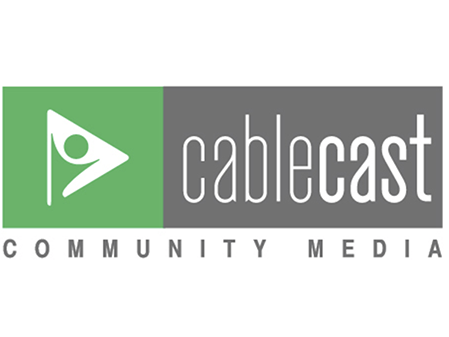Beloit TV Station Manager Jonathan Kelley
With a full-scale 4K upgrade of Beloit TV now in the rearview mirror, Jonathon Kelley, Station Manager and Adjunct Instructor of Media Studies at Beloit College in Beloit, is finding success with a newly revamped academic program that enables students to combine real world production experience with theory and creative opportunities.
BeloitTV anchors the Center for Entrepreneurship (CELEB Center), where students come to explore their independent projects and business ideas in music, art, digital media, and other fields. CELEB is located in an 18,000 square foot space downtown just blocks from campus where someone, sometimes a work-study student, is always in the BeloitTV studio during business hours Monday through Friday.
Both the CELEB space and BeloitTV have modernized over the last few years. Jonathon took over management of the station just prior to the upgrade. “We are completely 4K now,” said Jonathon, “everything you need to make slick and modern productions.” The studio sports three high-end studio cameras, three teleprompters, an array of backdrops, audio equipment, LED lighting and a control room that has a 4K-capable video processor, a professional grade multi-camera switcher and six monitors for lucky student directors to track the action with.
Jonathon explains that having high-quality equipment is not only important for creating a quality end-product and to mimic what a student might find in a workplace, but also critical for teaching novices video production. “Equipment has to function like it is supposed to function when you teach beginners. If it isn’t working the way it should, if you have to go wiggling cords, and troubleshooting, you can’t learn. Now with the upgrade, it’s easy to explain to students that if you push this button, ‘this’ will happen. I can take a complete novice and in 10 – 15 minutes they can be a contributing member of a production team.”
Jonathon is a graduate of UW-Whitewater and has a BA in Electronic Media and an MS in Mass Communications. He became interested in video at an early age. “Even as a kid, when I had to lug a heavy over-the-shoulder camcorder to make a film of a birthday party or the worst movie ever, I had so much fun,” he said. During high school, Jonathon was the morning DJ on WIBU, a polka radio station that no longer exists. He got interested in PEG access TV as a way to continue doing his talk show after the radio station changed formats. During the 1990’s, he was a community producer at WYOU in Madison and he also helped get the Lodi School District PEG access channel up and running.
Now at Beloit College, he has an opportunity to pass his enthusiasm on to his students. “I love my job,” said Jonathon. It’s kinda great to come to work every morning and make a TV show. Especially with students. There are lots of bright-eyed and bushy-tailed kids with creative ideas coming in every day. They think about the little things that can make a production extraordinary. I train them, manage the facility, and off they go.”
Most importantly, in his short time with Beloit TV, Jonathon is already seeing students launch careers. “Students are getting jobs in the field as a result of the work they are doing here. They’re launching careers that they will have for the rest of their lives. That’s very satisfying,” he said.
Jonathon teaches an introductory and an advanced class in television production every year and offers a third class that varies. In the intro class, students learn how to operate television production equipment and are required to put in “practicum hours” filming community events.
Community service is part of the core mission of BeloitTV, which was founded as a PEG (Public, Education, and Government) cable access channel in 1987. “The primary mission of BeloitTV is to produce and distribute programming of community interest while advancing the education and providing real-world experience for Beloit College students,” said Jonathon. The door is also open to the public. BeloitTV appears on Charter Spectrum cable channel 992 and is livestreamed from a Beloit College website. Programs are also uploaded to Facebook, YouTube and Twitter. BeloitTV turns a contractual obligation with the city to cover Beloit City Council meetings into an opportunity for students to get real-world experience. Under normal conditions, Beloit residents are also able to use the facility after being trained. A few public access shows are now running on the channel, but since the pandemic hit, the studio and field production equipment checkout have been closed to the public. This summer the media center’s review board will be discussing how to open back up again safely.
Jonathon is able to do a lot of local events coverage with a class of 25 people. “Our students cover on-campus lectures at the library, college sports, and community events,” said Jonathon. “If it’s open to the public, there’s a good chance that a Beloit student will be there covering it.” There is a learning curve for first-year students and in the early weeks, the focus is on training. “In the first half of the semester, students learn the basics of TV production. Then, half-way through the semester, I give them a written test and what I call a ‘road test.’ I ask them to demonstrate basic production tasks like tilting and pedestaling up, floor manager signals, how to check focus -- so that all first-year students are on the same page by that point. Then we can create content – not only for the community, but for student producers from the advanced class. These second-year students produce their own original productions and recruit their crews from first-year students as well as hold auditions for hosts and actors, if needed.”
This year, the third class Jonathon is teaching melds television production skills with film theory. “We’ve been developing a TNT-type movie series. Each student in the class picks a public domain film and is required to do an academic criticism of it and produce a brief two to three-minute introduction that includes a synopsis and a review. Once we decide on a film, we look hard to find the best recording of the film that we can,” said Jonathon. The end product is a movie series suitable for air on BeloitTV with an in-studio student introduction, the film, and a closing. “We have 24 different films right now including some horror films like Night of the Living Dead and Christmas-themed programs that we can air around the holidays. Many of the films featured are silent movies like Buster Keaton and Charlie Chaplain. Some of these older films are still wonderful to watch, but handle race in a woefully outdated and stereotypical way. Students are required to address these in their opening remarks.”
BeloitTV receives funding from the city, the college, and CELEB budgets. A Beloit city ordinance and a 1987 agreement between the city and Beloit College to share joint responsibility for the fledgling cable access channel has proved to be a win-win for both. Beloit College offers students real world experience in television production and city residents get local coverage of their community and an opportunity to make their own television productions. Feedback from the community is very positive. “We hear from a lot of people who like the programming we are creating,” said Jonathon.
However, in recent years, difficulties have arisen with Charter Spectrum. “We’ve been waiting for a digital upgrade. There has been delay after delay. Everything is analog now. We’re using an old 1980’s RF modulator. It’s been back and forth for over a year. Now they have given us a firm date of April 21 to complete the upgrade and they are charging us $12,000 to put in a new Drake unit and upgrade the link to the company’s headend. Basically they’ve told us that if we want an upgrade of the upstream link, we have to pay for it. Our options are, don’t have things working and worry the transmission equipment dies at any second or we give in and pay what they want. I don’t have the time or the money to argue with them about it.” And even after the upgrade, Charter Spectrum will not be carrying Beloit’s programming in HD, which has been the minimum viewing standard since just after the turn of the century.
“The days of cable TV will come to an end – maybe in 20 years,” said Jonathon. “But until then, we hope to serve that audience. We could post everything on YouTube, but you have to search it out. It’s not like the passive experience of TV that so many people are used to. Cable is a completely different way of viewing content. Where do you go if you don’t have cable to see local shows? Roku is not so easy to explain to people.”
Jonathon talked about how viewership is migrating to the streaming television market, which is undergoing rapid segmentation. Netflix revenue is down as viewers subscribe to one or more studio alternatives like Disney Plus, Paramount Plus, HBO Go, and Peacock. He noted that eventually there will be consolidation, but in the meantime, if you subscribe to several of them, it’s like paying for a cable subscription, but online. Jonathon said, “That has serious implications for local PEG access TV and local coverage.” Municipalities are seeing franchise fees decline as people drop cable and move to one or more streaming services. Per federal law, municipalities may charge companies like Charter Spectrum a franchise fee for using city streets based on a percentage of cable TV revenues, but they cannot assess a fee on revenue generated from the Internet side of a cable company’s business. “I’ve talked about the situation with management at the college. What will happen? We just don’t know.”
“For most of us in the government access TV field, the goal is not to ‘wow’ but to inform,” said Jonathon. “We are here as a resource -- where the community can come together,” he said. “It’s not commercially feasible to run a local newspaper or a broadcast channel today. That trend, coupled with the market’s predilection to moving to multiple media sources online, means the need for local content is higher today than ever. Our role as local media centers is to provide information to audiences wherever they are, including providing information to people not comfortable with getting their information from the Internet. Keeping the community informed by using cable TV is invaluable and Beloit TV stands behind WCM’s efforts to keep communities on cable TV.”
— Mary Cardona
















